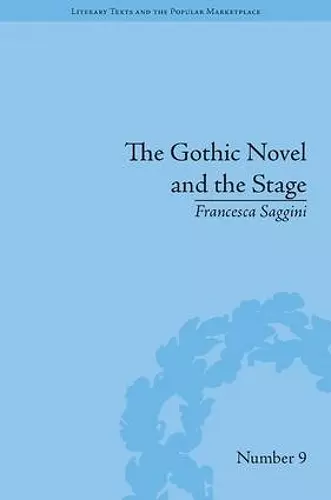The Gothic Novel and the Stage
Romantic Appropriations
Format:Hardback
Publisher:Taylor & Francis Ltd
Published:1st May '15
Currently unavailable, and unfortunately no date known when it will be back
This hardback is available in another edition too:
- Paperback£42.99(9780367875947)

In this ground-breaking study Francesca Saggini explores the relationship between the late eighteenth-century novel and the theatre, arguing that the implicit theatricality of the Gothic novel made it an obvious source from which dramatists could take ideas. Similarly, elements of the theatre provided inspiration to novelists.
Saggini opens her study with a very useful and persuasive overview of the themes and forms of Gothic drama. In her view, stage appropriation is the textual threshold in which novelistic and dramatic/ performative texts overlap on and disseminate through each other. She examines in details the use of three specific aspects of Gothic dramatic language as recorded by both novel and drama: music, lighting, and scene design. The following chapters, informed by semiotic and narrative theory, closely examine the stage appropriations respectively in and of the Gothic novel, particularly, though not exclusively, the representation of the supernatural in Ann Radcliffe and Matthew G. Lewis. Boaden’s successful Gothic drama Fontainville Forest challenges a central aspect of Radcliffe’s poetics: her reliance on the so-called explained supernatural and puts it context by looking at contemporary stage presentations of the supernatural as offered for instance in Hamlet. The final part of the study frames Lewis’s representation of the supernatural in The Monk within the contemporary mechanics of staging and discusses the novel in relation to contemporary stage presentation and in the context of Romantic harlequinades and spectacular visual exhibits.
Saggini makes a convincing argument for a transmedial and highly cooperative reading of Gothic texts and spectacles. Her approach does not seek to displace the novel or ‘the text’ from modern perceptions of the Gothic, but wants to open the genre to plural and anti-hierarchical forms of reading and to recognise its resourcefulness in appropriating theatrical techniques. The concept of ‘stage appropriation’ gives equal epistemological status to both verbal and non-verbal sign system, and this strategy allows for a holistic approach to the Gothic and an analysis of several literary-cultural formations as correlated, rather than discrete.
Received honourable mention for The Society for the Study of English Book Awards 2016, Literatures in the English Language, Category A
Shortlisted for the 2017 Allan Lloyd Smith Memorial Prize for Gothic Criticism awarded by the International Gothic Association (for a standout monograph published in 2015 and 2016).
'This study focuses on the relationship between the late 18th c. and early 19th c. Gothic novel and the stage. Saggini has carried out extensive research and has detected an impressive number of sources that record stage appropriations of Gothic novels. The book is dedicated to a highly neglected Romantic genre, i.e. drama, in a manner which combines structuralist analysis with contextual historical understanding. Saggini writes lucidly in a style that will appeal to readers also outside academia, and the book contains brilliant illustrations as well as clear overviews in table form. In sum, this is a significant work of admirable scholarship, thoroughly researched and admirably documented, offering valuable insights into the eighteenth-century culture.'- The European Society for the Study of English
'Saggini's articulation is clear, and her reasoning is innovative and complex… Saggini has researched her topic deeply, and the resulting book represents a thoughtful analysis of the practices and negotiations activated by the Gothic stage.' - Emily Hodgson Anderson, University of Southern California, Review 19
'By guiding the reader through the history and development of Gothic drama in the early sections of the book, Saggini effectively sets the scene of the genre’s background, before convincingly putting forward her argument that through a cultural network of stage theatricals and novel-writing, Gothic dramas inspired Gothic novelists.” - Sarah A. Winter, Studies in Gothic
ISBN: 9781848934146
Dimensions: unknown
Weight: 589g
310 pages